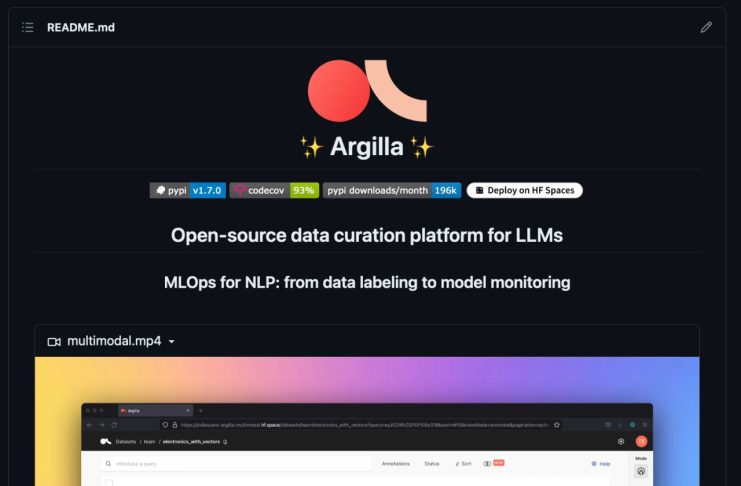TL;DR:
- Generative AI, particularly ChatGPT, has gained immense popularity.
- OpenAI’s GPT-4 version now supports multimodal data.
- Argilla is an open-source data curation platform for Large Language Models.
- Argilla assists in the full lifecycle of developing, evaluating, and improving NLP models.
- It supports major NLP libraries and allows customization without specific interfaces.
- Argilla provides an end-to-end solution for ML model development.
- It focuses on user and developer experience, empowering domain experts and engineers.
- Argilla offers innovative data annotation approaches beyond traditional hand-labeling.
- It supports data curation, evaluation, model monitoring, debugging, and explainability.
- Argilla can be locally deployed using the Docker command.
Main AI News:
Generative Artificial Intelligence has made significant strides in recent months, revolutionizing various industries. One standout example is ChatGPT, a highly popular chatbot developed by OpenAI. With over a million users, this Large Language Model (LLM) based on the GPT architecture has become indispensable for AI researchers and students alike. It excels in answering queries, generating accurate and unique content, summarizing lengthy text passages, and even completing code snippets. OpenAI’s latest iteration, GPT-4, has further enhanced ChatGPT’s capabilities by adding support for multimodal data. Notable LLMs such as DALL-E, BERT, and LLaMa have also contributed to significant advancements in the field of Generative AI.
In recent times, a new open-source data curation platform named Argilla has emerged to cater to the needs of Large Language Models. Argilla facilitates the complete lifecycle of developing, evaluating, and improving Natural Language Processing (NLP) models, from initial experimentation to production deployment. By leveraging both human and machine feedback, this platform expedites the data curation process, resulting in robust LLMs.
Argilla assists users throughout the MLOps cycle, offering support for data labeling and model monitoring. Data labeling plays a pivotal role in training supervised NLP models, as it involves annotating and labeling raw textual data to create high-quality labeled datasets. Conversely, model monitoring ensures real-time performance and behavior tracking of deployed models, thereby ensuring reliability and consistency.
The developers of Argilla have outlined several principles that underpin its design and functionality:
1. Open-source: Argilla embraces an open-source philosophy, granting free usage and modification rights to all. It seamlessly integrates with major NLP libraries such as Hugging Face transformers, spaCy, Stanford Stanza, and Flair, allowing users to combine their preferred libraries without the need for specific interfaces.
2. End-to-end: Argilla provides a comprehensive end-to-end solution for ML model development by bridging the gap between data collection, model iteration, and production monitoring. It views data collection as an ongoing process, continuously enhancing the model through iterative development across the entire Machine Learning lifecycle.
3. Enhanced user and developer experience: Argilla places a strong emphasis on creating a user-friendly environment, empowering domain experts to interpret and annotate data seamlessly while enabling engineers to maintain full control over data pipelines.
4. Beyond traditional hand-labeling: Argilla transcends traditional hand-labeling workflows by offering a suite of innovative data annotation approaches. It enables users to combine hand labeling with active learning, bulk labeling, and zero-shot models, resulting in more efficient and cost-effective data annotation workflows.
Argilla stands as a production-ready framework equipped with data curation, evaluation, model monitoring, debugging, and explainability capabilities. It automates human-in-the-loop workflows and seamlessly integrates with the user’s preferred tools. Local deployment is made simple with the Docker command: ‘docker run -d –name argilla -p 6900:6900 argilla/argilla-quickstart:latest’.
Conlcusion:
The emergence of generative artificial intelligence and advancements in Large Language Models, such as ChatGPT and Argilla, have significant implications for the market. These innovations provide businesses with powerful tools for natural language processing, data curation, and model development. With the support for multimodal data and the ability to generate unique and accurate content, companies can leverage these technologies to enhance customer experiences, automate processes, and gain valuable insights from vast amounts of textual data.
The open-source nature of Argilla and its seamless integration with major NLP libraries further contribute to the accessibility and scalability of these solutions. As a result, businesses can expect improved efficiency, increased productivity, and enhanced decision-making capabilities, driving competitiveness and growth in the market.

